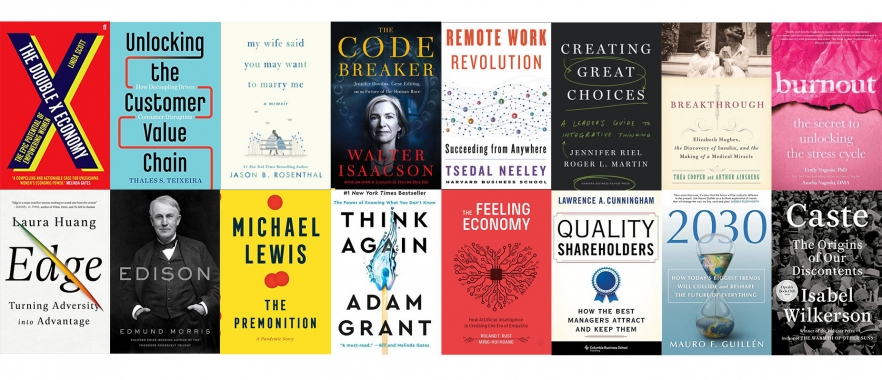
SMITH BRAIN TRUST – Planning to spend some time lazing around in a hammock this summer, or out at the beach? Wondering what to read on those long lazy afternoons? Maryland Smith's faculty has some recommendations.
The 18th annual Summer Reading List for Business Leaders from the University of Maryland's Robert H. Smith School of Business covers a range of topics again this year, including corporate strategy, AI, the pandemic, racism, burnout, love, the life of Thomas Edison, and the future of everything.
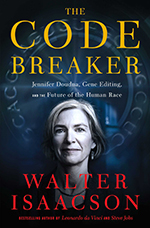
The Code Breaker: Jennifer Doudna, Gene Editing and the Future of the Human Race
By Walter Isaacson
"The story of Jennifer Doudna, Nobel-prize winning biochemist and co-inventor of the gene-editing technology known as CRISPR, relayed in the riveting prose that only a historian can compose is an inspiration to all aspiring women scientists. It offers a compelling window into the 'brave new world' of the future of the life sciences and medicine. Walter Isaacson brings Doudna to life with striking clarity, unveiling how scientific progress and discovery are both a competitive and a team sport."
–Ritu Agarwal, senior associate dean, Distinguished University Professor, Robert H. Smith Dean's Chair of Information Systems, and co-director of the Center for Health Information and Decision Systems.
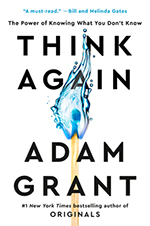
Think Again: The Power of Knowing What You Don't Know
By Adam Grant
"Organizational psychologist and Wharton Business School professor Adam Grant argues that it is often more beneficial to let go of our long-held convictions and embrace the joy of being wrong. Using numerous examples (even how N.Y. Yankee fans can root for their bitter rival Boston Red Sox), he shows how rethinking and rethinking one's convictions lead to a path of lifelong learning."
–Progyan Basu, clinical professor of accounting and information assurance.
"Intelligence is usually seen as the ability to think and learn, but in a rapidly changing world, there's another set of cognitive skills that might matter more: the ability to rethink and unlearn. In our daily lives, too many of us favor the comfort of conviction over the discomfort of doubt. We listen to opinions that make us feel good, instead of ideas that make us think hard. Unlearning and relearning requires more than learning something that you did not know previously—it requires choosing courage over comfort. When people are resistant to change, it helps to reinforce what will stay the same. In 2004 engineers and designers 'pitched' Steve Jobs on the iPhone by assuring him that they weren't trying to turn Apple into a phone company; it would remain a computer company, but they were only taking their existing product (iPod) and adding a phone on the side. But Mike Lazaridis resisted changing the Blackberry; he was 'trapped in an overconfidence cycle.' After reading this book, I hope that I can be more receptive of ideas that differ from mine. I hope to be a better listener."
–Elinda Kiss, associate clinical professor of finance.
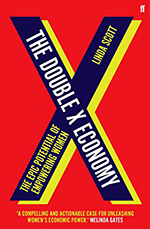
The Double X Economy: The Epic Potential of Women's Empowerment
By Linda Scott
"I was honored to have been able to host Linda Scott on a panel this past spring about closing the gender gap in the global economy. We discussed her book in some detail. 'The Double X Economy' examines the economic, cultural, societal and institutional conditions that affect the economic success of women and girls around the globe. Scott argues that undoing the institutionalized systems and rules that hinder women's advancement would raise prosperity and well-being for everyone. She underscores that many of these impediments have been erected and sustained purposefully to foster an uneven distribution of power between the sexes. Furthermore, she notes that the exclusion of women from traditional economic participation has created a shadow economy run by women that is even more collaborative and forward-looking than the one from which they have been systematically excluded. From the villages of Ghana to the slums of Bangladesh, classrooms in the U.S., and even boardrooms in the U.K., Scott takes us around the world to look at this 'double X economy' and how to dismantle barriers and create inclusive economies for the betterment of all."
–Rebecca L. Bellinger, executive director for Maryland Smith's Center for Global Business.
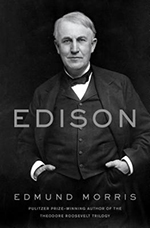
By Edmund Morris
"Since the specter of COVID-19, we have all become more attuned to the importance of technology in our lives. Our workdays are preoccupied with endless video conferencing on Zoom, Microsoft Teams and Google Meets. Now wind the clock back 142 years in America. Thomas Alva Edison creates and patents the necessary carbon filament to give the world its first incandescent light bulb. This 19th Century technological miracle would usher in an age of unprecedented productivity. In his scrupulously researched account, the late Edmund Morris gives us rare glimpses inside the professional and private life of this towering genius of innovation.
–Henry C. Boyd III, clinical professor of marketing, consultant, attorney at law.
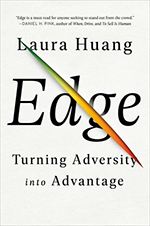
Edge: Turning Adversity Into Advantage
By Laura Huang
"Have you faced adversity? After this past year, all of us have! This book tells you how to turn what you've faced into an advantage. Harvard Business School professor Laura Huang, who will be joining me on June 23 for an inaugural MBA Book Club event, combines original research with compelling stories. And, if you love self-discovery, you can take Huang's Edge Quiz, which you can find on her website. I found out I'm a 'Creative Celebrity.' I'll take it!"
–Nicole M. Coomber, assistant dean of the Full-Time MBA program, and associate clinical professor of management and organization.

Burnout: The Secret to Unlocking the Stress Cycle
By Emily Nagoski
"We are all in a burnout crisis. So many of my colleagues and friends have confided in me that they are ready to give up. Before doing that, read this book. Emily Nagoski discusses why women experience burnout differently than men, and she gives practical strategies for addressing your own burnout. Of course, it's a great read for leaders too – we are all going to have to face the burnout crisis in our workplaces and deal with the massive turnover of employees that may result."
–Nicole M. Coomber, assistant dean of the Full-Time MBA program, and associate clinical professor of management and organization.

Remote Work Revolution: Succeeding from Anywhere
By Tsedal Neely
"This book, itself, is a revolution! We have been living what Harvard Business School professor Tsedal Neely has been preaching in this book the past year, and as we move into our hybrid work future, Neely has you covered. Practical strategies, great stories, and original research. She even has a whole chapter that addresses tech exhaustion (Zoom fatigue, anyone?) that helps you rethink how you use digital tools in service of your workplace goals."
–Nicole M. Coomber, assistant dean of the Full-Time MBA program, and associate clinical professor of management and organization.

Breakthrough: Elizabeth Hughes, the Discovery of Insulin, and the Making of a Medical Miracle
By Thea Cooper and Arthur Ainsberg
"This is a history book the way history should be taught; it is all about the people. You learn a valuable lesson about life from every character described."
–Samuel Handwerger, CPA and accounting lecturer.
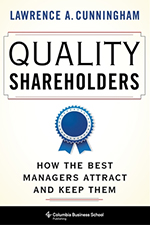
Quality Shareholders: How the Best Managers Attract and Keep Them
By Lawrence A. Cunningham
"I recommend this book, and I am quoted on the book jacket: 'Quality Shareholders highlights the close correlation between patient long-term investors and companies focusing on long-term strategies and profits. Its numerous examples of successfully run corporations with such dedicated shareholders will be of interest to individual and institutional investors alike.'"
–David Kass, clinical professor of finance.
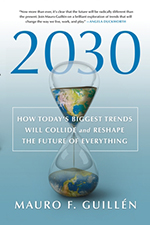
2030: How Today's Biggest Trends Will Collide and Reshape the Future of Everything
By Mauro Guillen
"The book outlines the major trends of today and shows how their interplay will determine our future. Some of the trends will feel familiar, but when Guillen gets into a discussion of the nuances, one finds oneself frequently surprised. For instance, by 2030, more than half the world's wealth will be owned by women, and much of the world's population growth will come from Africa. There is fascinating data, but also multiple powerful stories that bring the numbers to life. It outlines challenges we will face but also illustrates the kind of thinking that will allow us to rise to the challenges. 2030 is not so far away. We will be living and working in that future and need to prepare for it today. This book will be a useful guide for this."
-Kislaya Prasad, research professor and academic director for the Center for Global Business.
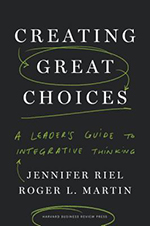
Creating Great Choices: A Leader's Guide to Integrative Thinking
By Jennifer Riel and Roger L. Martin
"It's a readable, 'how-to' sort of book, including exercises and templates, designed to help leaders develop new solutions to their important strategic decisions. An interesting tool here is the Pro/Pro list (rather than a Pro/Con) list to help leaders identify the key benefits they value from two different models, and then come up with novel options to obtain those benefits."
–Rebecca K. Ratner, Dean's Professor of Marketing.

Caste: The Origins of Our Discontents
By Isabel Wilkerson
"This book explains the origins and history of the American hierarchy and how American society influenced other societies globally. This fascinating book relates the American system to other countries, such as India and Germany, and places American culture in a global context."
–Lauren Rhue, assistant professor of information systems.
"Race as a manufactured concept is the subject of the book Caste. Alleged hierarchies of human beings are created by those who would benefit from it: Nazis over Jews, White male landowners over Africans brought to this country as enslaved people, and certain groups of Indians over others. Caste explores the similarities of these three caste systems, exposes the lies in their construction, and the long tail of destructive consequences that endure today. Incredibly readable, which makes it all the more powerful. If you have a road trip in your plans, listen to it – suitable for teenagers as well as adults."
-Judy Frels, senior fellow in Executive Development programs and clinical professor of marketing.
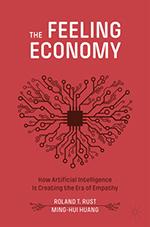
The Feeling Economy: How Artificial Intelligence Is Creating the Era of Empathy
By Roland T. Rust and Ming-Hui Huang
"This year I must suggest :-) 'The Feeling Economy: How Artificial Intelligence Is Creating the Era of Empathy,' by Roland T. Rust and Ming-Hui Huang. The book proposes the seemingly counterintuitive notion that the advance of AI is pushing humans to become more feeling-oriented."
–Roland Rust, Distinguished University Professor, David Bruce Smith Chair in Marketing, and executive director of the Maryland Smith Center for Excellence in Service.
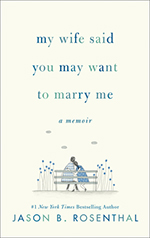
My Wife Said You May Want To Marry Me
By Jason B. Rosenthal
"Several days before her death from ovarian cancer, children's author Amy Krouse Rosenfield published an essay in the New York Times' Modern Love column titled 'You May Want to Marry My Husband.' A creative play on a personal ad, it encouraged her husband to find happiness after she died. The column went viral and reached over five million people worldwide. Her husband, Jason, wrote this book about their love story, his family and their struggle to navigate life without her. With a year full of losses due to COVID-19, this book serves as a reminder that healing is possible and that there is light ahead. A short read that will make you laugh and cry at the same time."
–Christine M. Schaaf, business communication lecturer.
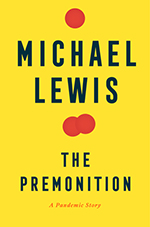
By Michael Lewis
"I just finished reading The Premonition by Michael Lewis, which is about the organizational failures – and personal courage – that contributed to our pandemic response this past year. The stories of how individual people worked to overcome organizational and institutional inertia are fascinating and likely to resonate. I think it has a lot of lessons to share about how we need to think differently to get large bureaucracies to step up in crises."
–Cynthia Kay Stevens, associate professor of management and organization.
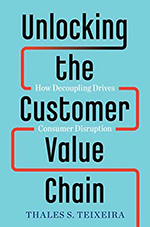
Unlocking the Customer Value Chain
By Thales Teixeira
"Thales Teixeira is a former PhD student of mine, was a professor at Harvard and now runs his own consulting company out of San Diego. The basic premise of the book is that new technology is not the primary driver of digital disruption; it's consumer behavior and preferences. Companies that seek disruptive innovation should understand their customers' value chain, which is made up of the steps consumers take to fulfill their needs."
–Michel Wedel, Distinguished University Professor and PepsiCo Chair in Consumer Science.
Media Contact
Greg Muraski
Media Relations Manager
301-405-5283
301-892-0973 Mobile
gmuraski@umd.edu
Get Smith Brain Trust Delivered To Your Inbox Every Week
Business moves fast in the 21st century. Stay one step ahead with bite-sized business insights from the Smith School's world-class faculty.